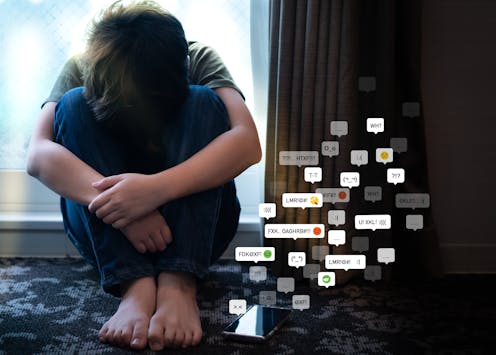Why social media makes you feel bad – and what to do about it
- Written by Divna Haslam, Senior Research Fellow, Queensland University of Technology

Have you ever found yourself scrolling through social media and noticed you felt a bit down? Maybe a little envious[1]? Why aren’t you on a yacht? Running a startup? Looking amazing 24/7?
The good news is you are not alone. Although social media has some benefits, it can also make us feel a little depressed[2].
Why does social media make us feel bad?
As humans we inherently compare ourselves to others to determine our self-worth. Psychologists call this social comparison theory[3].
We primarily make two types of comparisons: upward and downward comparisons.
Upward comparisons occur when we compare ourselves to someone else (in real life or on social media) and feel they are better than us (an unfavourable comparison for us) in whatever domain we are assessing (such as status, beauty, abilities, success, and so on).
For example, comparing your day at work to your friend’s post from the ski fields (we’re looking at you Dave!) is likely to be an upward comparison. Another example is making appearance comparisons[4] which can make you feel worse about yourself or your looks[5] .
Although upward comparison can sometimes motivate[6] you to do better, this depends on the change being achievable and on your esteem. Research[7] suggests upward comparisons may be particularly damaging if you have low self-esteem.
In contrast, downward comparisons occur when we view ourselves more favourably than the other person – for example, by comparing yourself to someone less fortunate. Downward comparisons make us feel better about ourselves but are rare in social media because people don’t tend to post about the mundane realities of life.
Comparisons in social media
Social media showcases the best of people’s lives. It presents a carefully curated version of reality and presents it as fact. Sometimes, as with influencers, this is intentional but often it is unconscious bias. We are just naturally more likely to post when we are happy, on holiday or to share successes – and even then we choose the best version to share.
When we compare ourselves to what we see on social media, we typically make upward comparisons which make us feel worse. We compare ourselves on an average day to others on their best day. In fact, it’s not even their best day. It’s often a perfectly curated, photoshopped, produced, filter-applied moment. It’s not a fair comparison.
That’s not to say social media is all bad. It can help people feel supported[8], connected[9], and get information[10]. So don’t throw the baby out with the bathwater. Instead, keep your social media use in check with these tips.
Concrete ways you can make yourself feel better about social media
Monitor your reactions. If social media is enjoyable, you may not need to change anything – but if it’s making you exhausted, depressed or anxious, or you are losing time to mindless scrolling, it’s time for change.
Avoid comparisons. Remind yourself that comparing your reality with a selected moment on social media is an unrealistic benchmark. This is especially the case with high-profile accounts who are paid to create perfect content[11].
Be selective. If you must compare, search for downward comparisons (with those who are worse off) or more equal comparisons to help you feel better. This might include unfollowing celebrities, focusing on real posts by friends, or using reality focused platforms like BeReal[12].
Redefine success. Influencers and celebrities make luxury seem like the norm. Most people don’t live in pristine homes and sip barista-made coffee in white sheets looking perfect. Consider what real success means to you and measure yourself against that instead.
Read more: Want to delete your social media, but can't bring yourself to do it? Here are some ways to take that step[13]
Practise gratitude. Remind yourself of things that are great in your life, and celebrate your accomplishments (big and small!). Create a “happy me” folder of your favourite life moments, pics with friends, and great pictures of yourself, and look at this if you find yourself falling into the comparison trap.
Unplug. If needed, take a break, or cut down. Avoid mindless scrolling by moving tempting apps to the last page of your phone or use in-built focus features on your device. Alternatively, use an app to temporarily block yourself from social media.
Engage in real life. Sometimes social media makes people notice what is missing in their own lives, which can encourage growth. Get out with friends, start a new hobby, embrace life away from the screen.
Get amongst nature. Nature has health and mood benefits[14] that combat screen time.
Be the change. Avoid only sharing the picture-perfect version of your life and share (in a safe setting) your real life. You’d be surprised how this will resonate with others. This will help you and them feel better.
Seek help. If you are feeling depressed or anxious over a period of time, get support. Talk to your friends, family or a GP about how you are feeling. Alternatively contact one of the support lines like Lifeline[15], Kids Helpline[16], or 13Yarn[17].
References
- ^ envious (www.sciencedirect.com)
- ^ depressed (www.sciencedirect.com)
- ^ social comparison theory (journals.sagepub.com)
- ^ appearance comparisons (www.sciencedirect.com)
- ^ your looks (www.sciencedirect.com)
- ^ motivate (www.sciencedirect.com)
- ^ Research (psycnet.apa.org)
- ^ supported (link.springer.com)
- ^ connected (publications.aap.org)
- ^ get information (asistdl.onlinelibrary.wiley.com)
- ^ perfect content (www.forbes.com)
- ^ BeReal (www.insider.com)
- ^ Want to delete your social media, but can't bring yourself to do it? Here are some ways to take that step (theconversation.com)
- ^ health and mood benefits (www.tandfonline.com)
- ^ Lifeline (www.lifeline.org.au)
- ^ Kids Helpline (kidshelpline.com.au)
- ^ 13Yarn (www.13yarn.org.au)
Read more https://theconversation.com/why-social-media-makes-you-feel-bad-and-what-to-do-about-it-197691

















